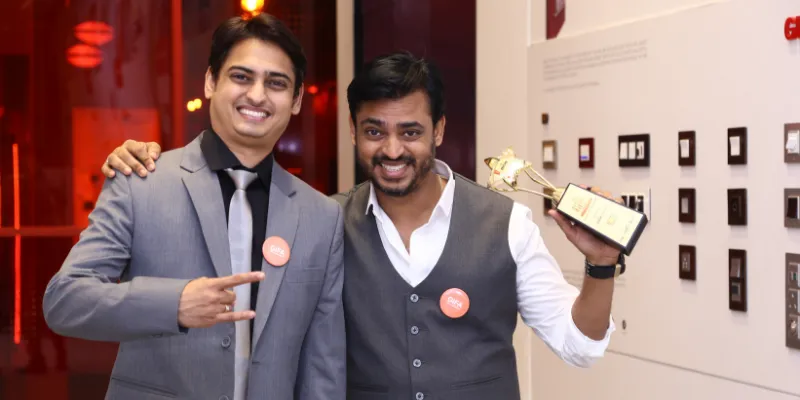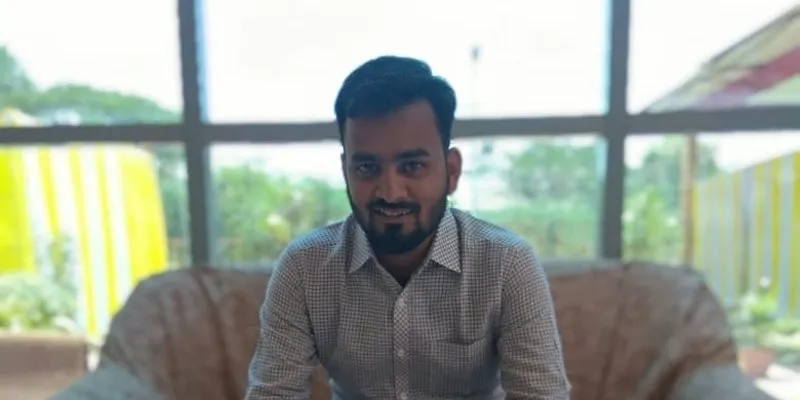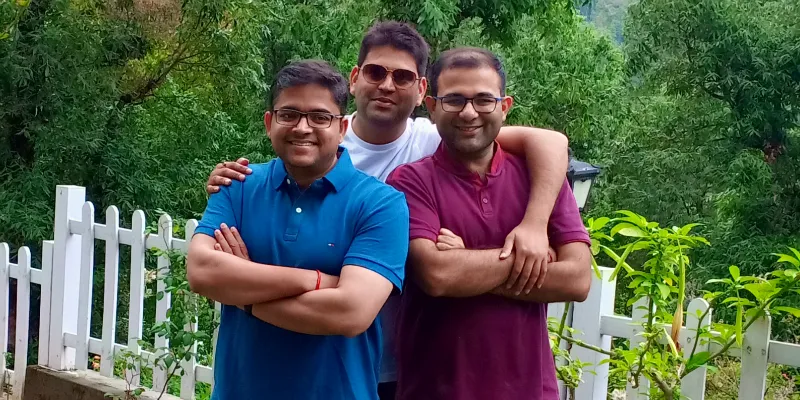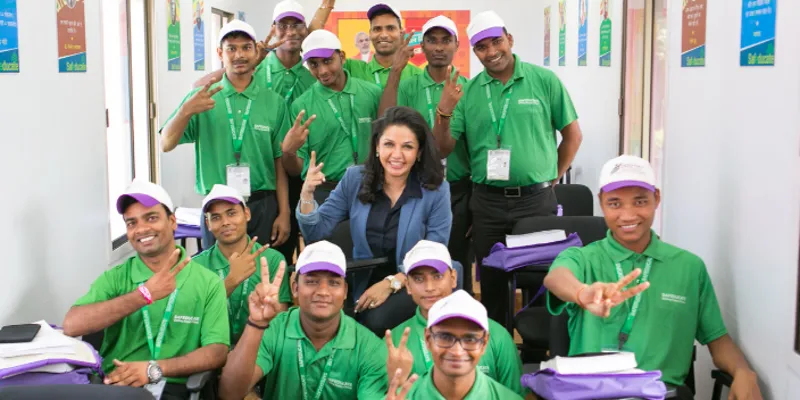[Year in review 2019] Top 10 SME entrepreneurs who have built sustainable businesses
Here are this year’s most inspiring stories of SME entrepreneurs who have been trailblazers and built businesses that are here to stay.

Entrepreneurs who follow a sustainable business model tend to outperform their counterparts who do not, over time. And, in today’s business ecosystem of stiff competition where innovative ideas rule the roost and change is the order of the world, it is vital to have a sustainable business model to maximise opportunities and mitigate adverse impacts.
Around the year, SMBStory covers the inspiring stories of SME entrepreneurs who have not only contributed to the Indian business ecosystem but have also seen growth by implementing a sustainable business model. These entrepreneurs have surely set an example for current and future generations by showing just how essential it is to build businesses that last.
Here are some of their stories:
Hosachiguru

Ashok J, Co-founder, Hosachiguru
Ashok J and Sriram Chitlur love nature. In 2008, when they were thinking about their retirement, they alighted on farming as a great opportunity. They not only wished to grow more trees, but were also looking to help others who wanted to enter farming.
The duo began their journey by investing a total of Rs 1 crore from their savings. The seeds were sown on Ashok’s ancestral property of 30 acres, and they began with planting sandalwood.
In an interaction with SMBStory, Srinath Setty (37), who joined the duo in 2014 to direct the sales and customer support, said,
“Both of them were already working full-time jobs, and they didn’t have time to make frequent visits to the farmland. So, they hit upon growing sandalwood, which has a gestation period of about 15 years.”
Longer gestation also has higher returns, Srinath pointed out. There are many challenges involved with planting other crops, like the suitability of the soil, fertilisers, and more. The duo wanted to play it safe as they had a sustainable plan in mind, he added.
After about five years, they chanced upon another idea. They thought of setting up a farmland management company that would acquire large land parcels and concert them into flourishing farms. Timber trees and other sub-tropical crops of the landowners’ choice could be cultivated, thereby achieving long-term wealth creation or passive income in the most sustainable way.
In 2013, after learning a lot more about farming techniques, they formalised the company, Hosachiguru. This was the time when Srinath joined them.
Hosachiguru believes in a focus on agroforestry, and there are two ways individuals can engage with them. Firstly, people who want to purchase farmland can buy from Hosachiguru with the options of developing the plot on their own or with the help of the company. Individuals can also go for development and management of existing farmland. (Provided it has a scale of 50+ acres and the landowner is willing to bring in the resources to set up a commercially viable agroforestry project.)
The idea took hold, and, in just five years, Hosachiguru captured 18 projects spread across 800 acres of farmlands of sandalwood, mahogany, and melia dubia. The company clocks an annual turnover of Rs 20 crore.
Hosachiguru sells the land for about Rs 60-Rs 65 per sqft, and its projects are sized up within three to four months of buying the land or even before they set up the basic infrastructure, Srinath claimed. The major share of the business model comprises Hosachiguru’s management of the farmlands for its customers.
The company has farmlands from which they are already selling melia dubia to a plywood manufacturer and trader in Mysuru.
Goldmedal Electricals

Bishan Jain (Director) and Kishan Jain (Director), Goldmedal Electricals
In 1979, Jugraj Jain and his father, Otmalji Goraji, started out from a small shop in Vijayawada, Andhra Pradesh, with a capital of Rs 2.5 lakh. Goldmedal Electricals traded the switches and wires of brands like Anchor, Sona, and SSK, among others. They would make wholesale purchases of the products and sell them after rebranding.
In 1980, Otmalji passed away, and Jugraj took up the reins and expanded the business to almost all the cities of Andhra Pradesh. Then, in 1995, Jugraj decided to hit the manufacturing segment. Goldmedal had already covered the Andhra Pradesh market. Jugraj’s thought was: why not manufacture our own products, rather than selling other brands?
That year, he moved to Mumbai, a hub for quality products, along with his family to set up his first factory. Goldmedal started by manufacturing urea switches and explored the Karnataka market as well. Gradually, the company started supplying its manufactured switches in both Andhra Pradesh and Karnataka. It also introduced border switches – urea switches with a border design.
In an interaction with SMBStory, Kishan Jain, Jugraj’s son and Director of Goldmedal Electricals, said this marked the beginning of Goldmedal’s pursuit of innovation to expand its market reach.
The third-generation leader’s foresight to invest in the expansion and modernisation of the company and its infrastructure has led to a rapid growth in the product portfolio.
The company began manufacturing polycarbonate switches in 2001 and launched a series, ‘3-Magic’, which soon gained prominence in the southern market, including in Tamil Nadu and Kerala. A few years later, Kishan’s brother, Bishan, also joined the family business, and, since then, there has been no looking back.
Working on its mission to bring innovation in the products, Goldmedal launched locking system switches in 2007.
That year was a breakthrough one in the company’s journey, with the launch of a variety of modular switches, after starting with traditional urea switches.
According to Kishan, their primary target market is electricians as they are the ones who use and install electrical products. If they are convinced, it is easy to take hold of the market, he said, adding.
At present, besides regular switches, Goldmedal Electricals manufactures switches with a music system and FM, Wi-Fi (retrofit) switches, stonewood switches, and glass plate switches with a locking system. Its range of modular switches can operate on a touch, tap, or swipe.
Goldmedal Electricals’ products are now available across India, and the company has outlets in Ahmedabad, Vijayawada, Mumbai, Siliguri, and Hyderabad.
Almost three decades since its founding, the company has 20,000 dealers based across the country and employs more than 1,000 people. It has done installation projects with Hyatt, and was also involved in Mumbai International Airport projects through a channel partner. The company vies with the likes of Legrand and Panasonic, and has recorded Rs 1,400 crore turnover in 2019.
Kesar Steel

Amit Chopra, Founder, Kesar International
In his early twenties, Bengaluru-based chartered accountant Amit Chopra was frequently jumping jobs. Having worked at a number of MNCs, he felt the urge to quit the corporate world and start his own business.
But, which industry to go for?
With his skill set, Amit could have easily started an accountancy or consulting firm. However, he decided to take a leap of faith and venture into the steel industry. In an interaction with SMBStory, he said,
“I wanted to be in an industry which wouldn’t slow down or stop. With some research, I saw that steel was a huge sector in India which was steadily growing.”
Amit was right about this; India’s steel production has been on the rise for a while now. The country was the world’s second-largest steel producer in 2018, with production standing at 106.5 million tonnes, according to data sourced by India Brand Equity Foundation.
However, venturing into steel production required a mammoth investment, and Amit was looking at something smaller.
“I saw that construction companies were facing difficulties sourcing customised types and sizes of structural steel products. They didn’t lack the ability to purchase; they were simply unable to get the right kind of steel products they wanted,” he said.
Realising that he didn’t need to start out with manufacturing, Amit decided to start a company to support construction firms by sourcing and supplying the right kind of steel products like steel angles, joists, beams, roads, bars, etc.
This brainwave led Amit to invest Rs 30 lakh from his savings and, with some help from his family, start Kesar International in Bengaluru in 2018.
The company’s objective is to source steel from other states, have it processed into steel products by rolling mills near Bengaluru, and sell the finished products to local clients.
Amit’s asset-light strategy has worked wonders. In its first year, Kesar International landed big clients like Prestige and Sobha and recorded revenue of Rs 10 crore. The entrepreneur said, “We started with investing in sourcing metals from Punjab, Madhya Pradesh, Chattisgarh, etc. We then hired rolling mills in places like Hindupur, Anekal, and Hosur, which are near Bengaluru.”
Amit’s venture has also helped revive a few of these industries. “They work for us on a project basis, which means we simply have to source steel from the northern states and send it to the rolling mills,” he added.
Since the rolling mills have already invested heavily in infrastructure and have the necessary approvals, this business model also saves Amit a lot of trouble. According to him, it’s difficult to achieve both manufacturing and customisation in-house. “With our model, it is easy to customise products and ensure quality and supply to clients. Steel has lots of quality issues, so we procure as per the standards,” he said.
Heritage Foods

Brahmani Nara, Executive Director (left) and Nara Chandrababu Naidu, former CM, Andhra Pradesh and Founder, Heritage Foods (right)
Former Chief Minister of Andhra Pradesh Nara Chandrababu Naidu, hailing from the dairy-rich district of Chittoor, has a farming background.
In the two decades before Heritage Foods' inception, India had been replicating the Amul dairy cooperative model at scale. This effort, known as Operation Flood, turned it from a milk-deficient nation into the world's largest milk producer. Brahmani Nara, Executive Director, Heritage Foods, in an interview with SMBStory, said,
“However, dairy farmers working with cooperatives in Andhra Pradesh did not have a good market to sell. There were inefficiencies and marketing challenges in the dairy cooperative system, and the sector had just opened to private players.”
In the early 90s, the Telugu Desam Party president saw local dairy farmers in Andhra Pradesh facing challenges with the dairy cooperative system that had been popularised across the country. Issues such as farmer payments, transportation, and marketability of milk products were becoming rampant in the region's dairy sector.
The politician decided to help farmers by setting up an organisation which would fuse the vision of dairy cooperatives with the efficiencies of a corporate or private player.
Heritage Foods has gone on to work with lakhs of farmers over the years and transformed into one of India's largest dairy brands.
“In FY19, Heritage Foods recorded a turnover of Rs 2,482 crores. We are present in 15 states and have reached out to over three lakh dairy farmers,” said Brahmani.
The company claims a significant presence in Andhra Pradesh, Telangana, Karnataka, Kerala, Tamil Nadu, Maharashtra, Odisha, Delhi-NCR, Haryana, Rajasthan, Punjab, Uttar Pradesh, Gujarat, Uttarakhand, and Himachal Pradesh.
Heritage Foods only retained the tenets of the Amul model that were working, such as elimination of middlemen, procuring of milk directly from farmers, ensuring good payments for them, processing the milk, and directing its sale to end consumers.
To execute this model, it launched its first processing facility in 1993. To grow the model, Heritage went public in 1994 through an IPO.
To deal with the ineffective facets of a dairy cooperative, Heritage followed a ‘relationship farming’ approach. “Farmers saw value in engaging with us as we remunerated them well and never defaulted on payments. We also gave them loans, insurance, cattle feed, and more. We didn't want to follow a transactional farming model,” Brahmani explained.
Kimirica Hunter International

Rajat Jain and Mohit Jain, Founders, Kimirica
Remember the tiny soaps and shower gels you used when you stayed at a Marriott, Hilton, or Sheraton hotel? In all likelihood, these hotel toiletries were manufactured by Indore-based startup Kimirica Hunter.
When brothers Rajat Jain (34) and Mohit Jain (31) launched the company in 2013, they were working out of a small 100-sqft room. The duo was facing bad debts and a huge cash crunch. Little did they know then that Kimirica would overcome these insurmountable odds to become India’s largest manufacturer of luxury hotel toiletries and guest room amenities.
Before becoming an entrepreneur, Mohit was writing his dissertation about launching a contemporary herbal skincare brand in India. With Rajat’s background in pharmacy and the family’s Ayurvedic business, the brothers were pretty confident about setting out on their own to manufacture herbal skincare products.
“Initially, everything seemed easy. But, after 10 months of rigorous research, we realised that launching on retail platforms would require products with varied formulations for specific skin and hair problems,” said Rajat, Co-founder and Managing Director, Kimirica Hunter.
The founders realised that they would also need a lot of time and large funds for marketing. Primarily due to a lack of funds, they started exploring a channel that would enable them to start with some small steps.
“While brainstorming, we remembered staying at a hotel. The miniature amenity bottles we had used stuck in our minds, and we were immediately inspired to get into this game," Rajat added.
The brothers took a closer look at the market. In conducting their research, they observed that more than 70 percent of the hotel amenity products used by international hotel brands were imported, and this channel came with its set of challenges.
Further, hotels and resorts were unique, with different themes and special ambiances, the brothers found. But, they observed that monotonous and conventional brand offerings were being made for all hotels.
Thus, there was a clear void in the market. The budding entrepreneurs resolved to fill this gap by selling locally-made, customised amenity products to hotel chains.
Kimirica Hunter is now worth Rs 300 crore and records a turnover of about Rs 90 crore. It serves a large number of international hotel chains such as Marriott, Starwood, Hilton, Jumeirah, Hyatt, Sofitel, and Pullman, as well as a range of independent luxury hotels.
In 2017, Kimirica signed a joint venture with Canadian hospitality product manufacturer Hunter Amenities, and thus its expanded brand name, ‘Kimirica Hunter’.
Retas Enviro Solutions

Retas founders Neeraj Chauhan (left), Priyank Jain (centre) and Ankit Magan (right)
One day in 2016, friends and MBA students Ankit Magan, Priyank Jain, and Neeraj Chauhan got stuck for more than 45 minutes in a relentless downpour in Gurugram.
As is the situation in large parts of the country, the roads were waterlogged and the drainage systems were choked up.
“There was so much wastage of water. We asked ourselves, what would happen if the city had to pay to receive rainfall? Would so much water go to waste?” recounted Ankit, speaking to SMBStory.
As the friends pondered this, they decided they had do something to preserve rainwater. Despite holding full-time jobs, they wanted to start their own rainwater preservation business and become ‘waterpreneurs’.
Six months later, in December 2016, they left their jobs and started Retas Enviro Solutions in New Delhi to design, manufacture, and install water tanks and modular rainwater harvesting systems.
“Our ‘Rainmaxxx tanks’ are used to collect, store, and infiltrate rain water for later use. Our modules are designed in such a way that they conserve rain water at the optimum level,” said Ankit.
Retas also offers services in watershed management, stormwater management, flood mitigation, and other environmental solutions.
In just two years, Retas has started servicing large clients such as TATA Steel, Reckitt Benckiser, SIEMENS, Hi-Tech Gears, HPCL, Government of Delhi, Government of Uttarakhand, and many more.
“With our team of 11 people apart from the three founders, we make around Rs 40 lakh to Rs 45 lakh worth of sales each month,” added Ankit.
Currently, the company follows a B2B model which has helped it become sustainable. Its primary customer base comprises industries, corporate houses, infrastructure companies, and government bodies.
Wingreens Farms

Anju Srivastava, Co-founder, Wingreens Farms
Anju Srivastava and her husband, Arjun, started Wingreens Farms as Women Initiative Network (WIN) in Gurugram in 2008, with a capital of Rs 10 lakh. Today, this sauces and dips company clocks monthly revenue of approximately Rs 8 crore. But, the recipe for its success is not built just on its tasty condiments. The couple’s motive to engage farmers and village women through the business has truly paid off.
The couple’s journey in entrepreneurship started when, after working in the US for several years in advertising and marketing, they decided to return to India. Back home, they were taken aback by the condition of the vulnerable farmers in India despite the country being a predominantly agrarian economy.
Their idea was to work in the area of farming.
“The toughest industry in my mind was agriculture, but I knew that this is where the need is. I knew nothing about farming, but I was determined to learn it,” Anju, Founder and Managing Director, Wingreens Farms, told SMBStory.
Anju wanted to work with farmers who had land but no money. In 2008, she started growing potted herbs in half-acre farmlands that she rented from farmers in Tauru village, Haryana. She grew varieties of basil, thyme, oregano, peppermint, and other herbs for sale. The idea, however, did not pan out, due to the extreme weather conditions in northern India.
WIN continued growing these herbs for three years, trying to beat the conditions, but in vain. In 2011, however, things started looking up when Anju made pesto from the basil she had grown and approached Spencer’s in MGF Megacity Mall in Gurugram with the product. She recalled,
“We approached Spencer’s with a request to let our boys market the pesto sauce by offering people a taste. The management in Spencer’s was very cooperative and they allowed us to do so. The irony was that we didn’t have pasta to serve along with pesto. Hence, we used chips and showcased pesto as a dip. And, to our surprise, it was received well as a dip, which we never intended as a category.”
Following the successful launch of this dip, WIN was rebranded as Wingreens Farms, and the company went on to launch a garlic dip. Since then, it has evolved enormously, and, at present, offers 150 variants of dips in 50 SKUs.
Working with two farmers, who are the company’s ‘farm managers’, and 150 village women for the manufacturing, Wingreens grows around 150 herbs and crops and offers dips, sauces, pita breads, and flatbreads. The company provides its farmers assured wages of approximately Rs 10,000 per month.
Now, over a span of eight years, Wingreens Farms has become a much sought-after brand whose products line the shelves of 10,000 stores across 100 Indian cities. Wingreens Farms has a team of 14 food technologists who follow the food-testing criteria and supervise quality control.
MK Jokai

Parimal Shah, President, MK Jokai Agri Plantations
Kolkata-based MK Jokai Agri Plantations Pvt Ltd is steeped in tea history. In the 1950s, when India gained Independence, MK Shah was finding his feet in the tea market. With the trade booming, he started a small tea-broking firm in a 200 sqft shop, trading orthodox (full-leaf) teas sourced directly from local manufacturers for foreign markets.
At a time when barter trading was prominent and India exported goods in exchange for resources, MK Shah explored the B2B segment of Russia (then USSR) and Poland.
Speaking to SMBStory, Parimal Shah (33), a third-generation tea entrepreneur and President of MK Jokai, said,
“My grandfather had a very modest background. He earlier worked in a tea-broking firm in Kolkata and slowly started his own. With utmost dedication and perseverance, fighting against all odds in times when communication was a big problem, he exported tea to the Russian market.”
The company used to supply orthodox teas to principle government agents in the USSR (a country that didn’t grow tea), and the Russian people loved the taste of the Indian tea leaf. In the 1970s, KM Shah joined his father as a 17-year-old to expand the business.
Parimal said, “At that time, USSR was undergoing a great political change which led to the formation of Russia. It was an opportunity we couldn’t afford to miss. My father was the first person in our entire family who stepped out of India to diversify the business.”
The company launched its maiden tea brand, MK Supreme, in 1984 through a tender for the Polish government, and soon spread its wings to Russia. The brand became an instant hit, and, in the 1990s, the company set up a subsidiary at St Petersburg in Russia.
“As orthodox tea farmers [focussing on whole-leaf teas], the tea we manufacture is sipped black, without milk, and straight. It is a premium variety, and it distinguishes us from the mass-market players who manufacture and deal in CTC [crush, tear, and curl] teas, which are the most popular teas preferred by Indians,” noted Parimal.
The company soon realised how important backward integration was. KM Shah then acquired the Nangdala Tea Estate in 1990 in the Dooars region of West Bengal.
In 1999, he purchased the prestigious garden of Koilamari. By 2000, Williamson Magor’s record deal added the renowned tea estates of Gingia, Seajuli, and Majhulighur to the company’s burgeoning collection.
In May 2005, the group acquired Rossell Industries from M/s Hindustan Lever, which came with seven prestigious tea estates.
Today, MK Jokai Agri Plantations Pvt Ltd owns about 12,000 acres of land, producing 6,500 metric tonnes of tea annually, and develops about 147 variants of teas for different geographical regions.
Clove Dental

Clove Dental founder and CEO Amarinder Singh
Private dental clinics are the major oral healthcare providers for the urban population of India. But, Amarinder Singh found the services of these dental clinics wanting.
In 2010, while visiting a dental clinic in Delhi, he had a particularly bad experience. "I was at the clinic for a tooth filling, and everything was going fine till I had to rinse and spit. That's when I saw the drain was dirty and unhygienic," he told SMBStory.
At that time, Amarinder had recently moved to India after a long stint in the US and Canada and was looking to venture into healthcare. After that experience, he decided to conduct some research into the oral healthcare industry.
What he found was alarming.
"Dental care in India was lacking in various things such as infrastructure, hygiene, and sterilisation. I saw the majority of Indians need some form of dental care, but only ten percent were going to a qualified dentist," Amarinder said.
He also found a general lack of awareness about the need for dental healthcare. "There are many links between oral disease and other ailments, but people don't know much about this. For instance, people think growing old means losing teeth. But, with the right dental care, there is no reason to lose teeth as one grows old," he explained.
Today, Clove dental has over 330 clinics in the major cities and towns of Andhra Pradesh, Delhi-NCR, Gujarat, Karnataka, Maharashtra, Punjab, Rajasthan, Tamil Nadu, and Telangana.
The clinics perform dental procedures such as fillings, root canal treatment, wisdom teeth removal, braces, implants, dentures, bridges, crowns, teeth whitening, etc. The company has recruited over 870 dentists and sees over 30,000 patients each month.
Last year, the business clocked revenue of $17.5 million (roughly Rs 124-plus crore) and is on track to open another 90 clinics this year and expand its footprint.
Safeducate

Divya Jain (centre), founder, Safeducate, with her team
Divya Jain (35) was working in her family-run business, Safexpress, one of India’s leading logistics companies, when she noticed a huge gap in the sector: a lack of skilled workforce.
Divya then started Safeducate in 2013 to address this gap. ‘Brands of India’ winner Safeducate is providing training in skill development and livelihood creation to truck drivers and other workers in the logistics and supply chain management sectors.
“I always wondered about the growth of people in the logistics sector. The lives of people in this sector are restricted to earning money and are not about growth, and that’s why they are stagnant. I want each truck driver, delivery guy, warehouse operator, and logistics accountant to envision what more they can do,” Divya told SMBStory.
Delhi-based Safeducate works to develop the right competencies in logistics workers so they can achieve a sustainable livelihood. It also aims to make them job-ready or kindle in them the entrepreneurial spirit.
“We have created around 60 ‘mobilisers’ to provide training in villages. We contact the district magistrates of those areas, and they connect us to self-help groups. We convey to these SHGs the future prospects in logistics,” Divya explained.
The company has been accredited with launching one of India’s first container schools. The Safeducate Container School, created using recycled shipping containers, was inaugurated by Prime Minister Narendra Modi on July 15, 2015.
With artificial intelligence (AI) and machine learning (ML) growing by leaps in India, Safeducate is looking to bring cutting-edge advancements to the field of logistics employment and has launched an AI-powered job portal.
Youth seeking jobs in the sector can upload their profiles, and the AI engine will match them with the perfect employer. Once the CV is shortlisted, the portal arranges a video interview with the candidate, and those selected are then given an offer letter. This particular disruption by Safeducate has provided major relief to job-seekers who would otherwise find it intimidating and cumbersome to travel to far-off locations in search of employment.
In a span of almost six years, Safeducate has trained around 50,000 people from 153 centres across India, including Allahabad, Chapra, Madnapur, Deogarh, and more. The company clocks Rs 30 crore in turnover.
(Edited by Athirupa Geetha Manichandar)


![[Year in review 2019] Top 10 SME entrepreneurs who have built sustainable businesses](https://images.yourstory.com/cs/21/0a385fc03e6011e999df3d1594bbde2c/SMBStoriesTOP10stories1575399674997png?mode=crop&crop=faces&ar=2%3A1&format=auto&w=1920&q=75)






